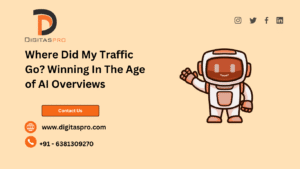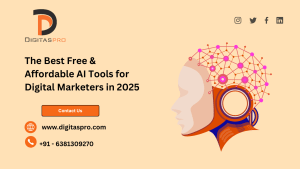In today’s hyper-competitive digital environment, traditional SEO methods are no longer enough. To stay ahead, businesses must adopt AI-driven SEO strategies—combining smart automation, real-time analytics, and predictive modeling to scale search visibility like never before.
From smarter keyword research to automated content optimization and voice search readiness, artificial intelligence is changing the SEO game. This blog breaks down how AI transforms SEO and how you can implement it in your strategy.
What Is AI-Driven SEO?
AI-driven SEO refers to the use of artificial intelligence technologies—including machine learning (ML), natural language processing (NLP), and automation tools—to enhance and automate SEO practices. These systems help marketers:
- Analyze massive data sets faster
- Understand user intent more accurately
- Automate content creation and optimization
- Predict algorithm shifts and search trends
AI tools like ChatGPT, Surfer SEO, Jasper, MarketMuse, and SEMrush AI Writing Assistant have made intelligent, data-backed SEO accessible—even to smaller teams.
Why Traditional SEO Falls Short Today
Search engines like Google have evolved. Their algorithms rely heavily on AI (like Google’s RankBrain and BERT) to understand context and intent—not just keywords. This means:
- Keyword stuffing no longer works
- Thin content gets penalized
- User experience and relevance matter more
Traditional SEO—relying purely on manual keyword placement and backlink-building—is now inefficient and slow. AI-driven SEO solves this by helping you adapt faster, optimize smarter, and deliver what search engines and users actually want.
Key Benefits of an AI-Driven SEO Strategy
1. Smarter Keyword Research
AI tools analyze millions of search queries and competitor pages to uncover:
- Long-tail, low-competition opportunities
- Keyword clusters by topic and intent
- Semantic relationships and question-based search terms
👉 Tools to try: SEMrush Keyword Magic Tool, Surfer SEO, Ahrefs, Google Gemini AI.
2. Optimized Content Creation
AI can now assist in:
- Generating SEO-friendly blog outlines and full articles
- Optimizing on-page SEO (headings, meta, alt text)
- Detecting content gaps vs competitors
- Enhancing readability and relevance
👉 Tools to try: Jasper, ChatGPT, MarketMuse, Grammarly, Clearscope
3. Predictive Search Trend Analysis
Machine learning can detect patterns in:
- Rising search queries
- Seasonality
- Emerging topics
- Algorithmic changes
This allows you to create proactive content before trends peak.
👉 Tools to try: Google Trends, Exploding Topics, AnswerThePublic + AI analytics integrations
4. Voice Search & Conversational SEO
AI helps tailor your content to how users speak, not just how they type.
- Voice search is increasing (especially on mobile + smart speakers)
- AI tools help optimize for natural language queries, featured snippets, and “zero-click” results
👉 Tip: Use FAQs, long-form Q&A, and schema markup to win featured snippets and voice searches.
5. AI-Powered Site Audits
Automated SEO tools now use AI to scan your site for:
- Broken links, missing alt text, page speed issues
- Technical errors like improper redirects or crawlability issues
- UX bottlenecks impacting ranking
They can even prioritize issues based on SEO impact.
👉 Tools to try: Screaming Frog (w/ ML integrations), Surfer Audit, Sitebulb, Semrush Site Audit
6. Automated SEO Workflows
AI and automation can manage repetitive tasks:
- Internal link building
- Meta tag optimization
- Image alt text generation
- Content repurposing
This frees up your time to focus on strategy and innovation.
👉 Tools like Zapier, Frase, and AI copy generators can automate much of the grunt work.
Real-World Examples of AI in SEO
🔹 HubSpot uses AI for content topic discovery and optimization based on user intent.
🔹 SEMrush applies machine learning in its content audit tool to improve readability and structure.
🔹 Surfer SEO uses AI to analyze top-ranking pages and build ideal content outlines based on SERP factors.
🔹 Netflix & YouTube use AI to optimize content metadata and improve discoverability.
Challenges & Risks of AI in SEO
Despite its advantages, AI isn’t perfect. Be aware of:
- Content duplication: AI-generated text may resemble existing content
- Over-optimization: Machines may focus too much on SEO rules and not enough on human value
- Lack of nuance: AI can miss tone, brand voice, and cultural sensitivity
- Dependence on tools: Avoid relying on AI without strategy or human input
Solution: Always pair AI with editorial oversight, human creativity, and strategic thinking.
Building Your AI-Driven SEO Strategy
Here’s a step-by-step framework:
1. Audit Your Existing SEO Stack
- Use AI tools to evaluate current rankings, content, and gaps.
2. Define Clear Goals
- Organic traffic? Rankings? Leads? Local visibility? Align tools with KPIs.
3. Choose the Right AI Tools
- Use a combination of keyword, content, and audit tools. Avoid bloated software stacks.
4. Map Topics with AI Assistance
- Create topical clusters and content calendars using NLP tools like MarketMuse or Frase.
5. Optimize Content with AI Guidance
- Follow real-time recommendations for structure, keywords, word count, and UX.
6. Automate Technical Fixes
- Regularly scan and fix site speed, metadata, schema, and links using automated reports.
7. Monitor & Adapt
- Use AI analytics to tweak pages based on bounce rate, time on site, and conversions.
Top AI SEO Tools in 2025
| Tool | Strength |
|---|---|
| Surfer SEO | Real-time content scoring, SERP analysis |
| Jasper AI | AI copywriting with SEO integration |
| MarketMuse | Content strategy, topic modeling |
| Frase.io | FAQ optimization, outline generation |
| Clearscope | Keyword density, content scoring |
| Semrush | All-in-one SEO + AI writing assistant |
| Ahrefs | Backlink + keyword insights with new AI integrations |
The Future of AI in SEO
As Google leans more into AI (with SGE – Search Generative Experience), expect:
- Conversational interfaces to dominate search
- Fewer traditional results, more AI summaries
- Personalization based on search history and preferences
Your SEO strategy should evolve accordingly—prioritize rich content, E-E-A-T (Experience, Expertise, Authoritativeness, Trust), and AI-compatible content structures.
Conclusion
An AI-driven SEO strategy isn’t just a trend—it’s the future of digital visibility. By blending machine intelligence with human creativity, you can stay ahead of algorithm shifts, save time, and unlock massive search traffic.
If you’re still relying solely on manual SEO, now’s the time to rethink. Integrate AI today, and prepare your brand for the next wave of search evolution.


